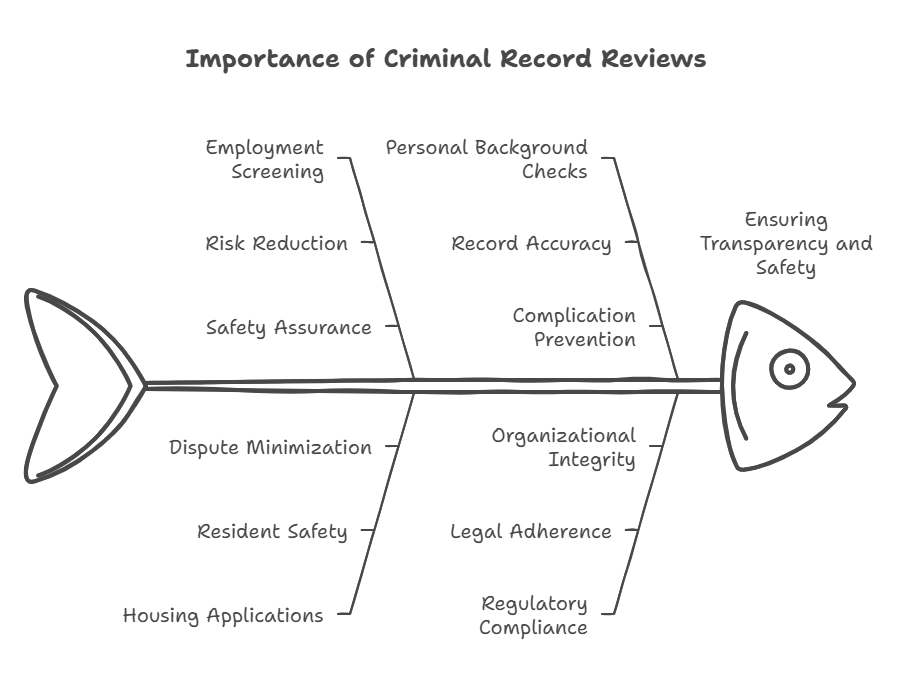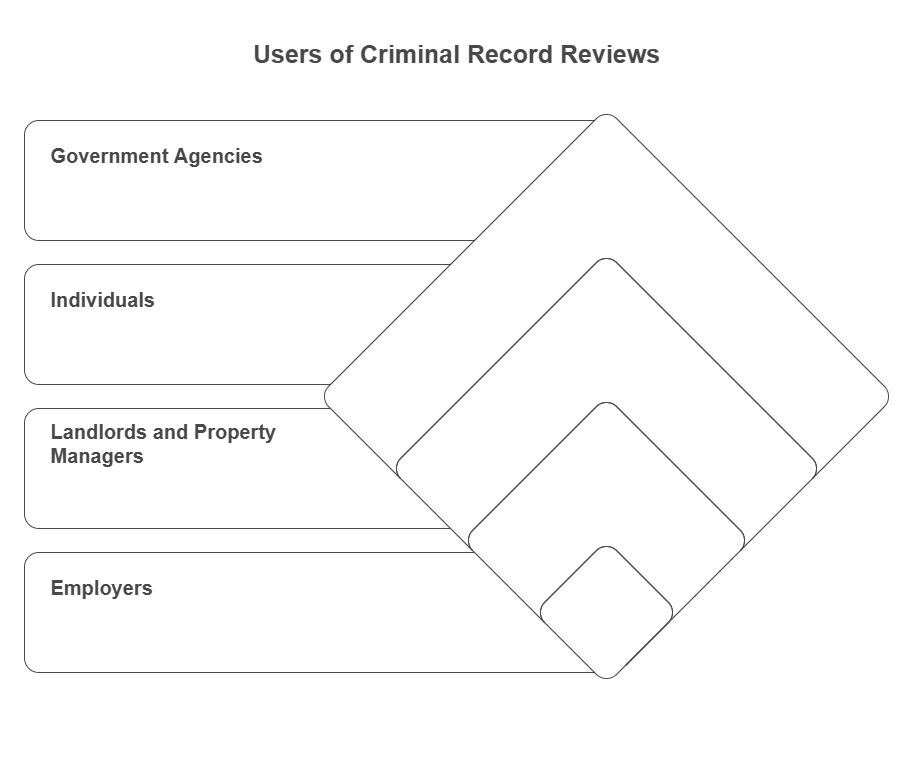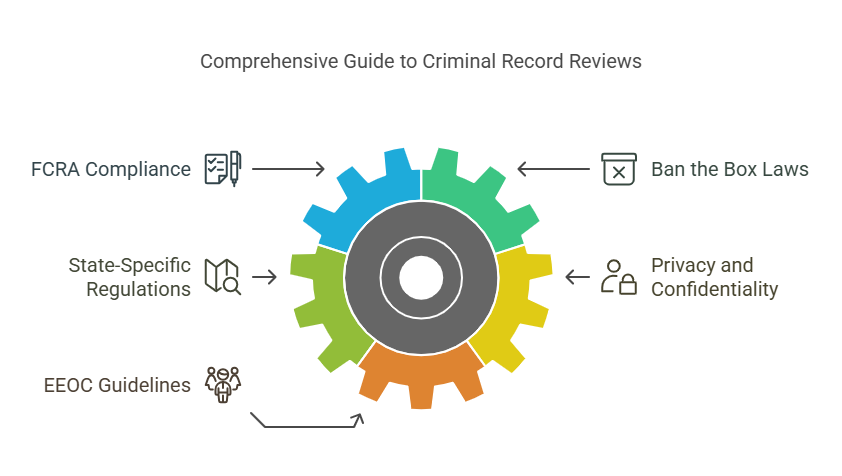What is a Criminal Record Review?

Introduction to Criminal Record Reviews
A criminal record review is the process of examining an individual’s criminal history to understand their past interactions with the legal system. It involves gathering detailed information about any arrests, convictions, court proceedings, or other criminal justice activities associated with the individual. Criminal record reviews are widely used across various sectors to ensure informed decision-making.
These reviews are essential for assessing an individual’s background, providing a reliable way to confirm legal compliance, and promoting safety in personal, professional, or community settings.
Why Are Criminal Record Reviews Important?

Criminal record reviews are vital for multiple reasons, as they serve to promote transparency, safety, and trust in various environments. Here are some primary reasons why criminal record reviews are conducted:
- Employment Screening
Employers often use criminal record reviews to evaluate job applicants, particularly for roles that involve handling sensitive information, working with vulnerable populations, or maintaining public trust. By reviewing an applicant’s history, employers can reduce risks and ensure a safe workplace. - Housing Applications
Landlords and property managers rely on criminal record reviews to assess potential tenants. These checks help protect the safety of residents and minimize risks of property-related disputes. - Personal Background Checks
Individuals may conduct criminal record reviews on themselves to verify their records’ accuracy, especially before applying for jobs, housing, or licenses. Ensuring the correctness of one’s criminal history can prevent complications during background checks. - Regulatory Compliance
Many industries, such as healthcare, education, and finance, have strict guidelines requiring organizations to conduct criminal record reviews. This ensures compliance with laws and regulations while safeguarding organizational integrity.
What Do Criminal Record Reviews Include?
Criminal record reviews encompass a range of information that provides a detailed view of an individual’s history. These records may include:
- Arrest Records
Information about any arrests, regardless of whether they led to convictions. Arrest records typically include the date, location, and charges. - Convictions
A detailed history of convictions for misdemeanors, felonies, and other offenses, including the type of offense and sentencing details. - Warrants
Details of any active or outstanding warrants issued against an individual. - Court Records
Documents related to court proceedings, such as trial records, plea agreements, sentencing, and case dismissals. - Parole or Probation Records
Information on any conditions of parole or probation, including terms, duration, and compliance.
It’s important to note that the availability of these records may vary depending on state laws and the agency conducting the review.
Who Uses Criminal Record Reviews?

Criminal record reviews are utilized by a wide range of individuals and organizations for different purposes. Some of the most common users include:
- Employers
Companies, especially those in regulated industries, conduct criminal record reviews as part of their hiring process. These reviews help employers make informed decisions about hiring and ensure compliance with industry regulations. - Landlords and Property Managers
Landlords use criminal record reviews to evaluate potential tenants and maintain the safety of their properties. These checks are often paired with credit reports and rental history reviews. - Individuals
People may request their own criminal records to ensure accuracy or understand what information is publicly available. This is especially important for individuals who are applying for jobs, seeking licenses, or trying to clear errors in their records. - Government Agencies
Federal, state, and local agencies often conduct criminal record reviews for purposes such as security clearances, law enforcement hiring, and regulatory compliance. - Legal Professionals
Attorneys and legal representatives may use criminal record reviews to gather relevant information for court cases or defense strategies.
Benefits of Criminal Record Reviews
Conducting a criminal record review provides several advantages, including:
- Enhanced Safety: Whether in a workplace, rental property, or community, criminal record reviews help identify potential risks and ensure the safety of others.
- Informed Decision-Making: Access to accurate criminal history information allows for fair and informed judgments, particularly in employment or housing scenarios.
- Regulatory Compliance: For businesses and organizations, conducting criminal record reviews ensures adherence to legal requirements and industry-specific standards.
- Transparency: Reviews promote accountability and trust by providing a clear picture of an individual’s history.
- Error Correction: Reviewing one’s own records can help identify inaccuracies and ensure that outdated or incorrect information is corrected.
Step-by-Step Guide to Conducting a Criminal Record Review
Conducting a criminal record review requires careful planning and adherence to legal guidelines. Below is a detailed step-by-step guide to help individuals and organizations navigate the process:
- Determine the Purpose of the Review
Identify the reason for the criminal record review, such as employment screening, housing applications, or personal use. This will help define the scope of the search and the type of information needed. - Obtain Consent (If Required)
If the review is being conducted on another individual (e.g., a job applicant or tenant), obtaining their written consent is legally required in most cases. This is especially important for employers to comply with the Fair Credit Reporting Act (FCRA). - Choose the Right Search Method
- State Criminal Records: Access state-level databases to find records specific to a particular state.
- County-Level Records: Conduct a search in the county where the individual resides or has resided in the past. County records are often more detailed and up-to-date.
- Federal Records: Review federal criminal records to identify offenses prosecuted at the federal level, such as white-collar crimes or large-scale drug trafficking.
- Third-Party Services: Use professional background check providers for comprehensive, multi-jurisdictional reviews.
- Collect Required Information
Gather essential details about the individual being reviewed, such as their full name, date of birth, Social Security number, and past addresses. Accurate information ensures a more reliable search. - Submit the Request
Depending on the search method, submit the request through the appropriate channels:- Public Records Databases: Many state or county agencies provide online portals for criminal record searches.
- Law Enforcement Agencies: Local police departments or sheriff’s offices may allow requests for criminal records.
- Professional Services: Background check companies streamline the process by providing fast, accurate, and comprehensive reports.
- Review the Results
Once the records are retrieved, carefully analyze the information to determine if it meets the criteria for the review. Look for any discrepancies or outdated information. - Follow Legal and Ethical Guidelines
Ensure compliance with all applicable laws, such as the FCRA and state-specific regulations. Handle sensitive information responsibly and maintain confidentiality throughout the process.
Challenges and Limitations of Criminal Record Reviews
While criminal record reviews provide valuable insights, there are several challenges and limitations to consider:
- Incomplete or Outdated Records
Not all records are updated in real time, and some databases may lack recent information, leading to incomplete results. - Variations in State Laws
Different states have unique regulations regarding what information is publicly accessible, which can impact the comprehensiveness of a review. - Sealed or Expunged Records
Certain records may be legally sealed or expunged, meaning they will not appear in a criminal record review. - Jurisdictional Differences
County, state, and federal records may contain varying information, requiring multiple searches for a comprehensive review. - False Positives or Identity Confusion
Common names or errors in data entry can result in inaccurate matches, highlighting the importance of using reliable services.
Importance of Criminal Record Reviews in Employment Screening
Criminal record reviews play a crucial role in hiring decisions, especially for roles requiring a high level of trust and responsibility. Industries such as healthcare, finance, education, and transportation often require thorough criminal background checks to ensure safety and compliance. Key benefits of these reviews for employment include:
- Risk Mitigation: Reducing the likelihood of workplace incidents by identifying potential red flags.
- Regulatory Compliance: Ensuring adherence to industry-specific regulations, such as those mandated by the Department of Transportation (DOT) or healthcare licensing boards.
- Improved Workplace Safety: Protecting employees, clients, and stakeholders by hiring trustworthy candidates.
How Exact Background Checks Simplifies Criminal Record Reviews
At Exact Background Checks, we provide reliable, comprehensive, and legally compliant criminal record review services for individuals, employers, and landlords. Our services offer several advantages:
- Accurate Results
Our advanced search tools ensure that all criminal records are accurate, up-to-date, and cross-referenced across multiple jurisdictions. - Fast Turnaround Times
We understand the importance of timely information. Our streamlined process delivers results quickly, without compromising accuracy. - Comprehensive Coverage
Whether you need state, county, or federal records, we provide thorough reviews that include arrests, convictions, court records, and more. - Compliance with Legal Standards
Our services are fully compliant with the Fair Credit Reporting Act (FCRA) and other relevant laws, ensuring ethical and legal use of criminal records. - User-Friendly Reports
We deliver clear and easy-to-understand reports, making it simple for you to analyze the results and make informed decisions.
Comparison: DIY Searches vs. Professional Services
| Feature | DIY Searches | Professional Services (Exact Background Checks) |
|---|---|---|
| Cost | Often free or low-cost | Service fees apply, but include added value |
| Accuracy | May be limited or prone to errors | Highly accurate, verified records |
| Comprehensiveness | Limited to specific databases | Covers state, county, and federal levels |
| Time Efficiency | Can be time-consuming | Quick turnaround with automated tools |
| Legal Compliance Guidance | Minimal | Full compliance with FCRA and other regulations |
Legal Considerations for Criminal Record Reviews

When conducting criminal record reviews, it’s crucial to understand and comply with applicable laws to avoid legal or ethical violations. Below are key legal considerations:
1. Compliance with the Fair Credit Reporting Act (FCRA)
The FCRA governs how criminal record reviews are conducted and used, particularly for employment purposes. Key requirements include:
- Informed Consent: Employers must obtain written permission from the individual before conducting a criminal record review.
- Pre-Adverse Action Notice: If an employer intends to take adverse action (e.g., not hiring a candidate) based on the review, they must provide a copy of the report and a summary of the individual’s rights.
- Dispute Process: Individuals must be given an opportunity to dispute inaccurate or incomplete information.
2. “Ban the Box” Laws
Many states and municipalities have enacted “Ban the Box” laws, which prohibit employers from asking about criminal history on job applications. Employers must wait until later in the hiring process—usually after a conditional job offer—to inquire about or review criminal records.
3. State-Specific Regulations
Each state has its own rules regarding access to criminal records. For example:
- Sealed or Expunged Records: States like New York and California restrict access to records that have been sealed or expunged.
- Disclosure Limits: Some states limit how far back criminal record reviews can go (e.g., seven years).
4. Privacy and Confidentiality
Under laws like the Health Insurance Portability and Accountability Act (HIPAA) and general privacy guidelines, individuals’ criminal records must be handled with care. Confidentiality is essential to avoid legal liability or reputational harm.
5. Equal Employment Opportunity Commission (EEOC) Guidelines
The EEOC advises employers to ensure that criminal record reviews are not discriminatory. This includes avoiding blanket policies that disproportionately affect certain groups and evaluating candidates individually based on the nature of the offense, its relevance to the job, and how much time has passed.
Frequently Asked Questions (FAQs) About Criminal Record Reviews
How long does it take to get results from a criminal record review?
The timeline varies depending on the method used:
- Public databases may provide instant results.
- County or state agency requests can take several days or weeks.
- Professional services like Exact Background Checks often deliver results within 24–72 hours.
Can a criminal record review show sealed or expunged records?
No, sealed or expunged records are typically not accessible in criminal record reviews. These records are legally hidden from public view and cannot be used in hiring or housing decisions.
Are criminal record reviews part of standard background checks?
Yes, criminal record reviews are a key component of most background checks. Employers, landlords, and organizations often include them to ensure safety and compliance with regulations.
How can I dispute incorrect information on my criminal record?
To dispute errors:
- Request a copy of your criminal record from the agency that provided it.
- File a dispute with the reporting agency or background check provider, explaining the inaccuracy.
- Provide supporting documentation, such as court orders or other official records.
- The agency is required to investigate and correct inaccuracies within a reasonable timeframe.
Do employers need consent to conduct a criminal record review?
Yes, employers are legally required to obtain the individual's written consent before conducting a criminal record review. Failing to do so can result in legal penalties and violations of the FCRA.
Conclusion
Criminal record reviews are a vital tool for ensuring safety, transparency, and compliance in various situations, from employment screening to personal use. Conducting these reviews responsibly requires understanding the process, adhering to legal guidelines, and addressing limitations such as incomplete or outdated records.
Key Takeaways:
- Criminal record reviews provide access to valuable information, including arrests, convictions, and court records.
- Legal compliance with the FCRA, “Ban the Box” laws, and state-specific regulations is essential.
- Sealed or expunged records are generally not included in criminal record reviews.
- Professional services like Exact Background Checks offer fast, accurate, and legally compliant solutions for criminal record reviews.
At Exact Background Checks, we simplify the process by providing reliable, up-to-date, and thorough criminal record reviews. Whether you are an employer, landlord, or individual, our services ensure compliance with legal requirements while delivering accurate results. Partner with us for a seamless experience that saves time and eliminates uncertainty in criminal record reviews.



